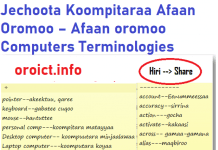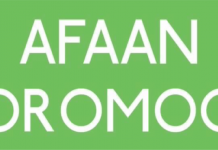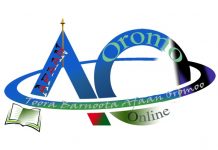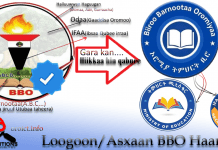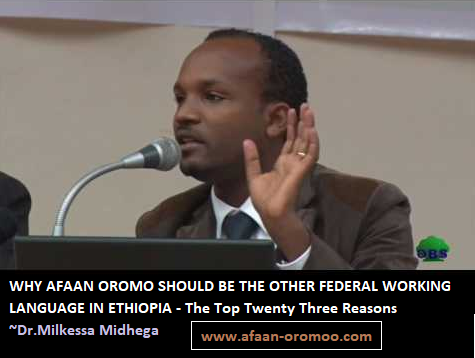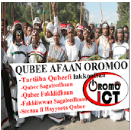The Top Twenty Three Reasons
~ Milkessa Midega
In March 2015 Dr. Birhanemeskel Abebe, a renowned Ethiopian academician, came up with “Top Ten Reasons why Afaan Oromo should be the federal working language”. His observation reminded me of my own M.A. thesis defended in 2003 Ethiopian Academic Year at Addis Ababa University (AAU). The title of my thesis was “Ethiopia’s Choice of Federal Working Language and Its Implications for Non-Amharic Languages: The Case of Afaan Oromoo”. The overall thesis was devoted to theoretical understanding of the general principles and international comparative experiences, and practical consequences of choosing working language/s in multilingual countries. It explored the reasons used (and should be used) for adopting working language/s. In this brief reflection, I would like to build on the ten points raised by Dr. Birhanemeskel based on the major findings of my thesis.
Before listing the top twenty three compelling reasons one by one, however, it is important to make clarifications on some points that are commonly misunderstood by many. First, the term ‘working language’ is not the same with the term ‘national language’. A working language is a procedural administrative or office language. It is a language that is given a unique legal status in supra-national organizations such as the UN and the AU, federation or province or other body as its primary means of government communication: in short public service delivery language. The term ‘official language’ may not necessarily mean office language. This is so because official language (legal status) is often connected with wider political issues of sovereignty, nationalism, and the rights of indigenous peoples and ethnic minorities, including immigrant communities. (Abraham, 1990). The term ‘national language’ elevates the language in question to the status of the national identity/citizenship, the national flag and the national anthem (Mputubwele, 2003).
Secondly, the working language of the Federal Government of Ethiopia is not the same with the working language of Ethiopia. This is the most mistaken or confused among scholars too. Ethiopian federation has several working languages in different jurisdictions. Thus, Ethiopia has not one but several working languages. More specifically, Amharic is not the only working language of Ethiopia; it is the only working language of the federal government (See FDRE Constitution, 1995: Article 5).
Why Afaan Oromoo as another federal working language
I targeted Afaan Oromoo for the fact that it is the largest mother tongue in Ethiopia spoken by 34% of the country’s population followed by Amharic which is spoken by 29%, according to a 2007 report by the Central Statistic Authority (CSA). Other non-Amharic languages might be researched for similar reason.
Accordingly, below is the a quick list of the top 23 justifications for considering Afaan Oromoo as the other working language of the federal government of Ethiopia.
- The first (1) is the right to non-discrimination at the hands of the state due to language, which is stipulated in Art. 2 of the Universal Declaration of Human Right and Art, 1 of the Convention against Discrimination in Education of 1960.
- The rights of individuals belonging to linguistic minorities to participate effectively according to Art 2 of the 1992 UN Declaration on the Rights of Persons Belonging to National or Ethnic, Religious or Linguistic Minorities.
- Collective equality of linguistic groups.
- For the state legitimacy purpose (Turgeon and Gagnon, 2013).
- Symbolic social identity (primordial benefit) of the working language choice.
- Demographic factor: the numerical size of the speakers of a certain language in proportion to the whole population (sliding scale model) is the most frequent reason (See, for example, a memorandum signed between the Union and individual States of India in 1956; See also Part IV of the European Charter for Regional or Minority Languages, 1992).
- Tax consequences of language choice: the state has the burden to exactly compensate those who must learn the chosen language (in terms of time, money and moral) through negative taxes (receive a subsidy) (Pool, 1991).
- To rectify historical linguistic central injustices which promised that “We, the Nations, Nationalities and Peoples of Ethiopia… Fully cognizant that our common destiny can best be served by rectifying historically unjust relationships” (Preamble of the Constitution).
- Power sharing requires language: The composition of the federal leadership has to reflect the diverse society it claims to represent.
- To enhance national consensus and unity, and discourage separatist nationalism.
- Freedom of expression aspect of federal language choice: The right to express opinion freely implies the right to do so in the language of one’s own choice in accordance with Art 19, of the International Covenant on Civil and Political Rights (ICCPR).
- Mass media consequences of federal language choice: the chosen language will be given a favor (through the state subsidy and private business preferences) in broadcasting media, print media and online media.
- Language is part of the medication. The language in which patients are treated in federal hospitals matters.
- For the purpose of democratic participation: “Where political debate is conducted in the selected language, the speakers of other languages are at a disadvantage” (Patten & Kymlicka, 2003).
- Federal language choice has federal culture choice implication. Language carries culture. Take for instance music programs of federal media such as ETV (now EBC) and FM 97.1.
- The economic contribution of linguistic groups: Major sources of incomes including drinking water.
- Geographical settlement and geopolitical significance of the language (Kebede, 2005).
- It is an opportunity for non-Afaan Oromoo speakers who want to learn Afaan Oromoo and wish to integrate into and work in the regional state of Oromia (for both public and private purposes).
- Trans-national reasons: Afaan Oromoo is the third largest indigenous mother tongue in Africa (Mohammed, 2010).
- Civil service employment reason: everywhere the working language is the property of those who use it as a mother tongue or who can learn to use it as well (Weinstein, 1983); See also Federal Civil Service Employment Reports). Restricted participation eventually means that one group is dominated by another.
- Material or wealth consequences of language: disagreement over the working language is “a disagreement about who shall participate in power, wealth and prestige” in a given jurisdiction (Weinstein, 1983: 15).
- The capital (seat) of the Federal Government is located in the state of Oromia whose working language is Afaan Oromoo. This capital is also the capital of the Oromia regional state. And last
- Experiences of multilingual countries: federal working languages of Canada are two, Switzerland (three), Belgium (three), South Africa (eleven), India (two), Singapore (four), Fiji (three), Nigeria (one foreign language), and Cameron (opts for two foreign languages).
Ed’s Note: Milkessa Midega is a PhD Candidate at the Addis Abeba University (AAU) Center for Federal Studies. He can be reached at: milkessam@gmail.com.
Source: Addis Standard



